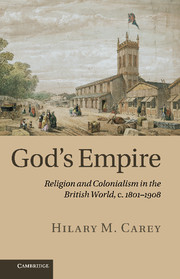Book contents
- Frontmatter
- Contents
- List of figures
- List of maps
- List of tables
- Preface and acknowledgments
- List of abbreviations
- Maps
- Part I God's empire
- 1 Colonialism, colonisation and Greater Britain
- 2 Protestant nation to Christian empire, 1801–1908
- Part II Colonial missionary societies
- Part III Colonial clergy
- Part IV Promised lands
- Conclusion
- Bibliography
- Index
- References
1 - Colonialism, colonisation and Greater Britain
Published online by Cambridge University Press: 04 February 2011
- Frontmatter
- Contents
- List of figures
- List of maps
- List of tables
- Preface and acknowledgments
- List of abbreviations
- Maps
- Part I God's empire
- 1 Colonialism, colonisation and Greater Britain
- 2 Protestant nation to Christian empire, 1801–1908
- Part II Colonial missionary societies
- Part III Colonial clergy
- Part IV Promised lands
- Conclusion
- Bibliography
- Index
- References
Summary
Greater Britain – the English-speaking settler colonies of the British empire which we are more likely now to refer to as the British world – was an idea as much as a set of territories. For the free Christian churches of the peoples of Great Britain and Ireland, it was also a mission field. This is a novel idea and one which I hope to argue throughout the course of this book. Chapter 1 begins by examining the idea of Greater Britain, first as a concept in the writing of Charles Wentworth Dilke (1843–1911), and then as it was taken up by the churches who adopted the term as their own in the last decades of the nineteenth century. It also introduces topics raised in subsequent chapters which examine the arrangements and organisations that were marshalled across the empire in order to provide religious services for colonists. In subsequent chapters, this book considers the development of missions to British settlers, including the colonial missionary societies (Chapters 3 to 7), missionary training colleges for colonial clergy (Chapters 8 to 10), church emigration societies (Chapter 10), and Christian colonisation (Chapters 11 and 12). Together, these provisions for the colonial churches helped shape the powerful, shared sense of British identity that suffused the British world and to which Dilke was able to give a name.
- Type
- Chapter
- Information
- God's EmpireReligion and Colonialism in the British World, c.1801–1908, pp. 3 - 39Publisher: Cambridge University PressPrint publication year: 2011



